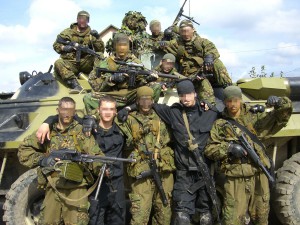Russian special operations troops are working covertly in Syria to support an array of Iranian-backed fighters, including members of the international terrorist group Hezbollah, U.S. defense officials and counterterror experts say.
The Spetsnaz commandos were detected working closely with military forces of the regime of Syrian leader Bashar al-Assad, as well as several Iranian-backed groups, which even include armed Iraqis and Afghans.
Officials did not disclose the specific numbers of Spetsnaz troops in Syria but said the numbers were in the dozens.
Recent operations involving Spetsnaz forces have been focused on attacking anti-regime rebels near the northern city of Aleppo. The city has also been a target of Russian airstrikes.
However, officials said reports from Syria that Spetsnaz troops are working with pro-Iranian Hezbollah forces are a growing concern. Officials are worried the terrorist group, which is known for attacking Americans, will gain valuable military know-how from the Russian commandos.
Hezbollah, or Party of God, is a Lebanon-based terror group that the U.S. Counterterrorism Center has linked to numerous attacks that have killed scores of Americans since the 1980s.
“Although Hezbollah’s leadership is based in Lebanon, the group has established cells worldwide,” the Center states.
Hezbollah’s leader stated in May 2013 that the group is backing the Assad regime by dispatching fighters to Syria.
“Russian-Hezbollah cooperation and coordination in Syria has been going on since the outset of Russia’s entry into the civil war,” said David Daoud, a Middle East analyst at the Foundation for Defense of Democracies.
“Iranian and Hezbollah sources have openly admitted, on a number of occasions, that Hezbollah ground operations during key battles in the war were carried out with Russian air support,” Daoud said. “So it wouldn’t be surprising that there’s now cooperation between Hezbollah’s ground forces and Russian special forces.”
Despite its record of anti-U.S. attacks, the U.S. government has done little to counter Hezbollah or retaliate against it.
Hezbollah’s military commander, Imad Mughniyah, was killed in a car bomb attack in Damascus in February 2008. Israel was suspected of carrying out the bombing.
Iranian-backed militants and organizations like the Iranian Revolutionary Guard Corps have long been suspected of serving as Russia’s de facto “ground force” in Syria, according to defense officials monitoring the situation.
One Pentagon official recently told the Washington Free Beacon that military sources have continued to monitor “Iranian-sponsored forces providing support to the Syrian regime in their fight against Syrian opposition forces.”
Rep. Ed Royce (R., Calif.), chair of the House Foreign Affairs Committee, disclosed late last year that military leaders had informed him of Hezbollah-led “ethnic cleansing” campaigns.
“I’ve been briefed on the fact that [Iran is] even bringing in militias from Hezbollah and their families into Sunni dominated neighborhoods in Damascus and running their Sunni population out as they basically do an ethnic cleansing campaign,” Royce said.
The deployment of Russian special operations troops to Syria illustrates the growing role for covert military forces from numerous countries in the war-torn country.
Defense Secretary Ash Carter disclosed last month that U.S. special operations commandos are operating in Syria to assist rebel forces opposing the Islamic State (ISIS).
The U.S. commandos were sent in November as part of the Obama administration’s latest strategy to defeat the terrorist group.
The elite U.S. warriors are engaged in intelligence-gathering, targeting enemy forces, and advising rebels.
“These operators have helped focus the efforts of the local, capable forces against key ISIL vulnerabilities, including their lines of communication,” Carter said in a speech Jan. 13, using an alternative acronym for ISIS. “They are generating new insights that we turn into new targets, new strikes, and new opportunities.”
Recent news reports from Syria have indicated Hezbollah is working with Spetsnaz troops in the eastern part of the country.
The Arabic-language Al Rai newspaper reported on Jan. 26 that the commandos were making military advances in the mountains north of Latakia.
“Special forces from the Russian army equipped with Howitzer artillery, supported by warplanes and backed by elite units from Lebanon’s Hezbollah … have been entering the fiercest of battles in the heights and towns of Latakia,” the newspaper reported. The paper quoted sources in a Damascus operations center that included military forces from Russia, Iran, Iraq, Syria and Hezbollah.
Boris Zilberman, also with the Foundation for Defense of Democracies, said the Russian-Hezbollah collaboration is not surprising.
“Russia recently said they do not consider Hezbollah a terrorist group and there are unconfirmed reports that Hezbollah militants participated in the search and rescue of the downed Russian Su-24 pilots,” Zilberman said.
Two Russian pilots were shot down and one killed when their aircraft strayed into Turkish airspace in November.
Russia continued airstrikes in northern Syria on Monday with Moscow reporting attacks on ISIS oil depots near Aleppo and other areas.
Two weeks ago, Western reporters visited Russia’s main Syrian base at Hmeimim, near Latakia, where Spetznaz troops were seen conducting security details. The commandos reportedly were dispatched to Syria on orders from Russian leader Vladimir Putin.
Russia’s special operations troops are considered among the most well-trained and well-equipped elite troops used for both combat and intelligence-related activities.
Russian bombers destroyed more than 1,300 terrorist targets in 468 sorties over the past week, Russia’s state-run Interfax news agency reported Feb. 1.
The strikes were carried out by Tu-22 bombers and Su-35 strike aircraft.
freebeacon.com



